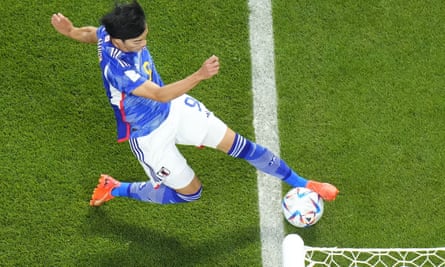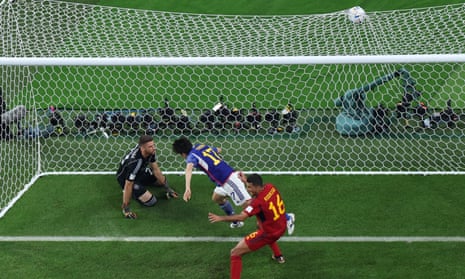Suddenly they went wild and just as suddenly they stopped again. Japan’s players though would be given a second chance and so, it turned out, would Spain’s. Ao Tanaka had bundled the ball into the net, the World Cup was upside down again and a sprint had begun, squad and staff racing each other from bench to corner to join their colleagues on the pitch. Hajime Moriyasu’s side had scored twice in three minutes and so, for the second time at this tournament, they were now winning a match that had seemed way beyond them; that hadn’t seemed like a match at all, in fact.
Better still, 2-1 up out of nowhere, just as they went ahead out of nowhere against Germany, they were on their way through. Except the ball had crossed the line as it had been scrambled into the six-yard box for the finish. Or so it seemed. From one angle, it looked clearly over the line, but there were others, lines to be drawn and a drama to be drawn out. So now everything was on hold.
In the corner, they froze mid‑celebration like a mannequin challenge. Moriyasu spoke to the fourth official. Sergio Busquets tried to speak to the referee. And the referee, Victor Gomes, tried to listen, which wasn’t easy. He stood and waited, finger in his ear. In the VAR room, they took their time. In the stands, some prayed. The seconds passed, the first sign that this might not be what it seemed. And then, eventually, Gomes drew a screen, pointed to the centre and Japan’s players went wild again, for the third time in six minutes.
It would not be the last. This was extraordinary, a repeat of that opening win. By the end, the manager was bowing before the crowd. An hour earlier, they would not have embraced him like they did at that moment. Back then, Japan had been outplayed, unable to get near the ball. Now they were all over Spain, driven by need, destiny, not allowing the Selección to breathe.
Quick GuideQatar: beyond the football
Show

It was a World Cup like no other. For the last 12 years the Guardian has been reporting on the issues surrounding Qatar 2022, from corruption and human rights abuses to the treatment of migrant workers and discriminatory laws. The best of our journalism is gathered on our dedicated Qatar: Beyond the Football home page for those who want to go deeper into the issues beyond the pitch.
Guardian reporting goes far beyond what happens on the pitch. Support our investigative journalism today.
It was hard not to wonder how good they would be if they could do this in both halves, to ask how Ritsu Doan and Kaoru Mitoma could be introduced only at the break. That energy is hard to maintain, of course. Imagine if you could do that for 90 minutes.
How had Spain permitted this? As Japan’s players celebrated the second, which ultimately sent them through, on the touchline the Spain manager, Luis Enrique, shook his head. On the goalline, Unai Simón stood, looking lost, as if trying to work out just what they had done. They had shot themselves in the foot. Shot? Can you pass yourself in the foot? Because that’s what had happened: Spain had played the Japanese back into the game.

Japan had played themselves into it, too, but Busquets said the Selección breathed life into them. It is systemic, too, which makes the analysis more lasting. Playing out is a choice and the right one, the coach and goalkeeper insist, but it is a fine line they tread. Simón says he is the free man, there to play as well as save. Teammates must use him. They accept potential consequences, if maybe not like this. Every game brings at least one heart attack with the ball at Simón’s feet, it seems; this time, it was almost fatal.
He had already risked dribbling by an opponent in the first half. Early in the second, under pressure, Japan identifying him as a target, he played a pass to the left. The ball came back to him and he clipped to the right. Alejandro Balde struggled to control it. Tanaka robbed him and smashed the ball into the net.
after newsletter promotion
Japan led, Spain had got themselves into a fine mess. Or was this actually better? They were going through in second place, avoiding the possibility of a quarter-final against the Group G winners, almost certainly Brazil, getting an extra day’s rest, too. There was one flaw: it assumed Spain went through and soon that was not so assured. Elsewhere, Costa Rica scored and for a while Spain and Germany were both out. There was panic now, and not much play until a roar rolled off the stands and revived them.
Germany’s pursuit of survival did not ultimately rescue them but did save Spain, allowing them to secure a scenario so perfect you almost wondered if the whole thing had not been a masterplan, an act of genius, with act being the word: the Selección progressed in a better place and Germany were out.
The way they walked off, though, spoke of the fear they had felt, that aura of confidence they had exuded gone, the two teams through but expressing very different emotions, outwardly at least. Spain’s players departed, heads down but still in. All around them the Japanese were celebrating again.
